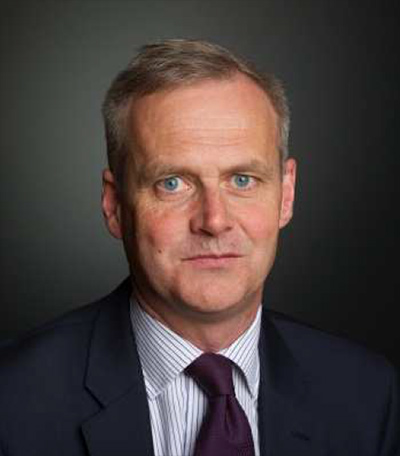 For Boris Ruge, Minister and Deputy Chief of Mission for the German Embassy in Washington, D.C., an M.A. in History from UNC was an important step to a career in the foreign service.
For Boris Ruge, Minister and Deputy Chief of Mission for the German Embassy in Washington, D.C., an M.A. in History from UNC was an important step to a career in the foreign service.
“Of course, studying history is a very good preparation to be a diplomat,” Ruge explained. “It teaches you political analysis, and that’s a big part of what historians do, even people who don’t think of themselves so much as political historians. I think it’s always political in one way or another, what you do as an historian, in terms of the subject matter.”
Ruge received a Fulbright Scholarship and enrolled at UNC in 1985. Although still unsure if he wanted to pursue a career in foreign service, Ruge was already interested in political analysis. Under the direction of Gerhard Weinberg, now Professor Emeritus, Ruge examined the United States’ role in the initial phase of European integration after World War II. It was in part because of Weinberg, whom Ruge described as “a wonderful person, and a great adviser,” that Ruge gained so much from his two years at UNC. “I would say that in terms of my university-level education, Chapel Hill was definitely the most important experience that I had.”
Training in history is not uncommon for German foreign service members, and Ruge works with a number of other historians, including the current German ambassador to the United States. Historians, Ruge believes, are particularly qualified to assess sources of information, write, and debate, skills of great importance to any nation’s foreign service. “This is the internet age.… We’re confronted with an overload of information, and so for anyone interested in political analysis, sorting through information and assessing it, weighing it, distilling what is actually significant and relevant, I think that’s key,” Ruge said. “And I think historians are trained to do that—certainly at UNC’s History Department.”
Foreign service members must also understand how a nation’s past shapes its present circumstances. “What is important is maybe not so much sometimes what actually happened, as what people remember, or imagine, happened.” Ruge explained. “That’s crucial, the way people imagine their national history, their past. That creates the frame of reference in which you have a debate, including in this country, on all sorts of issues.”
Ruge’s historical training proved particularly helpful in his previous position as the German Ambassador to Saudi Arabia and the Special Envoy to the Organization of Islamic Cooperation. The Kingdom of Saudi Arabia, founded in the 1930s, is a fairly new country. This shapes its current political circumstances and debates.
“If you look at this country and analyze the politics, social developments, and so on, you have to take into account that it is a very young country and that, if we go back to the 1930s, it was a preindustrial, very traditional country. And one that was, by the way, never colonized, if you disregard fairly small territories on the Red Sea and on the Gulf,” Ruge said.
“Those are some of the key historical features that, I think, impact on the makeup of the country today. And I think when we engage with Saudi Arabia, there are many, many considerations, but one of them would be human rights and women’s rights in particular,” Ruge explained. “For all the disagreements that we had with the government of Saudi Arabia on the issue of human rights, what I appreciated as an ambassador was that I was able to engage with many people who were advocating on behalf of human rights, who were critics of the government. I was able to meet with them, to engage with them, and in some cases have them come to the embassy. I think that is not something that is typical of the region.”
Although Ruge only took the position as Minister and Deputy Chief of Mission for the German Embassy in Washington, D.C. in August 2016, he has already begun to travel the United States to participate in public engagements on behalf of the ambassador. He returned to UNC in November and again in March 2017, when he spoke about the continued partnership of the European Union and the United States.
— Aubrey Lauersdorf
